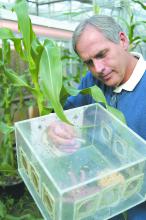Information Possibly Outdated
The information presented on this page was originally released on December 11, 2008. It may not be outdated, but please search our site for more current information. If you plan to quote or reference this information in a publication, please check with the Extension specialist or author before proceeding.
International award recognizes MSU entomology graduates
MISSISSIPPI STATE -- A working relationship that began 40 years ago has led to international recognition for a pair of Mississippi State University entomology graduates.
James H. Tumlinson and W. Joe Lewis are recipients of the 2008 Wolf Prize in Agriculture for their contributions to the field of chemical ecology. The Israel-based Wolf Foundation gives Wolf Prizes in the areas of medicine, agriculture and the arts. The Wolf award is considered agriculture’s equivalent of a Nobel Prize.
Both Tumlinson and Lewis earned degrees at MSU in the late 1960s. Tumlinson received a master’s in organic chemistry with a minor in entomology, as well as a doctorate in organic chemistry with a biochemistry minor. Lewis earned his bachelor’s, master’s and doctorate at MSU, all in entomology.
After leaving MSU, both entered careers with the USDA Agricultural Research Service, with Tumlinson serving as a research chemist in Gainesville, Fla., and Lewis as a research entomologist in Tifton, Ga. They soon began collaborating on research to determine how plants react when under attack from insects.
“When I was at Tifton and Jim was at Gainesville, we partnered up, with him doing the chemistry side and me the entomology side,” Lewis said.
Over the years, the partnership grew into a team of scientists, including chemist John A. Pickett in the United Kingdom, who shares the 2008 Wolf award.
“The research recognized by this award was conducted over at least three decades by numerous really excellent students and research associates,” Tumlinson said. “It has been an interdisciplinary team effort. No one person or laboratory alone could have accomplished this.”
The long-term research has yielded a wealth of information about the responses of plants to insect attacks, including the relationships between plants and beneficial insects.
“One of the finds is that when under attack from plant-feeding insects, such as boll weevils and bollworms, plants have an ability to recognize they are in danger and to emit SOS-type signals to recruit the good guys,” Lewis said. “Once we made that discovery, we saw that a lot of things we do in plant breeding and with certain agronomic practices cause plants to lose that ability.”
In announcing the award, Yuli Tamir, Israel’s minister of education and chair of the Wolf Foundation council, noted that the team of scientists were selected “for scientific contributions on chemical ecology, which have fostered the development of integrated pest management and significantly advanced agricultural sustainability.”
Tumlinson is currently the Ralph O. Mumma Endowed Professor of Entomology and director of the Center for Chemical Ecology at Pennsylvania State University. Lewis recently retired from USDA-ARS.




